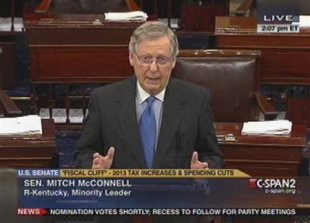
In a brief speech on the Senate floor, McConnell complained that Democrats had not yet placed a counter-offer to his latest proposal, delivered at 7 pm on Saturday, “despite the obvious time crunch.”
“I’m concerned about the lack of urgency here,” the Kentucky lawmaker said. “I think we all know we’re running out of time.”
There is “far too much at stake for political gamesmanship. We need to protect the American families, and businesses, from this looming tax hike,” McConnell said. “In order to get things moving, I have just spoken with the majority leader, I also placed a call to the vice president to see if he could help jump-start the negotiations on his side.”
“The vice president and I have worked together on solutions before, and I believe we can again,” McConnell declared.
Absent a breakthrough, income tax rates will rise across the board while government spending on domestic and defense programs will be slashed – a combination that some experts warn could plunge the economy into a new recession. Obama has pressed for extending Bush-era tax rates on income up to $250,000 but letting them expire above that threshold. The two sides have also been at odds on issues like the estate tax and whether to extend unemployment benefits that stand to expire for some two million Americans.
“We’re willing to work with whoever, whoever can help,” McConnell said. “There’s no single issue that remains an impossible sticking point. The sticking point appears to be a willingness, an interest, or frankly the courage to close the deal.”
“I’m willing to get this done, but I need a dance partner,” he said.
Democratic Senate Majority Leader Harry Reid said he had spoken several times on Sunday with President Barack Obama but acknowledged that his side had been “unable” to present a counter-offer to the latest Republican proposal.
“He and the vice president, I wish them well. In the meantime I will continue to try to come up something but at this stage I don’t have a counter-offer to make,” Reid said. “We are apart on some pretty big issues.”
Reid noted that Democratic and Republican senators were to huddle separately to discuss a possible way forward and said he remained “hopeful but realistic” about the prospects for a breakthrough.
But he also seemed to confirm that one key sticking point was a Republican demand for reducing Social Security payments but adopting a less generous cost-of-living calculation known as “chained CPI” (the CPI being “consumer price index,” a measure of inflation).
“We’re not going to have any Social Security cuts,” Reid declared, saying it would not be “appropriate” in a short-term deal. Democratic leaders have cautiously signaled support for that approach – but only as part of a larger-scale deal that would see the U.S. debt limit raised for a significant stretch of time. Republicans want to use the debt ceiling fight to wrangle deeper government spending cuts.
“We're willing to make difficult concessions as part of a balanced, comprehensive agreement,” Reid said, “but we'll not agree to cut Social Security benefits as part of a small or short-term agreement, especially if that agreement gives more handouts to the rich.”
“At some point in the negotiating process, it becomes obvious when the other side is intentionally demanding concessions they know the other side's not willing to make. We are not there,” the Nevada lawmaker said, but that point is “real close.”
Republican House Speaker John Boehner has said that it's up to the Senate to craft a compromise that can clear both chambers of Congress. Boehner suffered an embarrassing setback 10 days ago when conservative opposition forced him to withdraw legislation that would have let taxes rise on income of above $1 million. But a senior Republican aide noted that the exercise allowed the speaker to gauge how many of his rank-and-file would accept any increase in tax rates.










